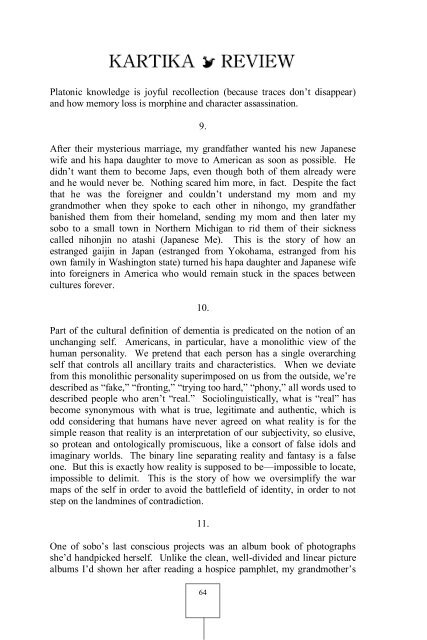You also want an ePaper? Increase the reach of your titles
YUMPU automatically turns print PDFs into web optimized ePapers that Google loves.
Platonic knowledge is joyful recollection (because traces don’t disappear)<br />
and how memory loss is morphine and character assassination.<br />
9.<br />
After their mysterious marriage, my grandfather wanted his new Japanese<br />
wife and his hapa daughter to move to American as soon as possible. He<br />
didn’t want them to become Japs, even though both of them already were<br />
and he would never be. Nothing scared him more, in fact. Despite the fact<br />
that he was the foreigner and couldn’t understand my mom and my<br />
grandmother when they spoke to each other in nihongo, my grandfather<br />
banished them from their homeland, sending my mom and then later my<br />
sobo to a small town in Northern Michigan to rid them of their sickness<br />
called nihonjin no atashi (Japanese Me). This is the story of how an<br />
estranged gaijin in Japan (estranged from Yokohama, estranged from his<br />
own family in Washington state) turned his hapa daughter and Japanese wife<br />
into foreigners in America who would remain stuck in the spaces between<br />
cultures forever.<br />
10.<br />
Part of the cultural definition of dementia is predicated on the notion of an<br />
unchanging self. Americans, in particular, have a monolithic view of the<br />
human personality. We pretend that each person has a single overarching<br />
self that controls all ancillary traits and characteristics. When we deviate<br />
from this monolithic personality superimposed on us from the outside, we’re<br />
described as “fake,” “fronting,” “trying too hard,” “phony,” all words used to<br />
described people who aren’t “real.” Sociolinguistically, what is “real” has<br />
become synonymous with what is true, legitimate and authentic, which is<br />
odd considering that humans have never agreed on what reality is for the<br />
simple reason that reality is an interpretation of our subjectivity, so elusive,<br />
so protean and ontologically promiscuous, like a consort of false idols and<br />
imaginary worlds. The binary line separating reality and fantasy is a false<br />
one. But this is exactly how reality is supposed to be—impossible to locate,<br />
impossible to delimit. This is the story of how we oversimplify the war<br />
maps of the self in order to avoid the battlefield of identity, in order to not<br />
step on the landmines of contradiction.<br />
11.<br />
One of sobo’s last conscious projects was an album book of photographs<br />
she’d handpicked herself. Unlike the clean, well-divided and linear picture<br />
albums I’d shown her after reading a hospice pamphlet, my grandmother’s<br />
64


